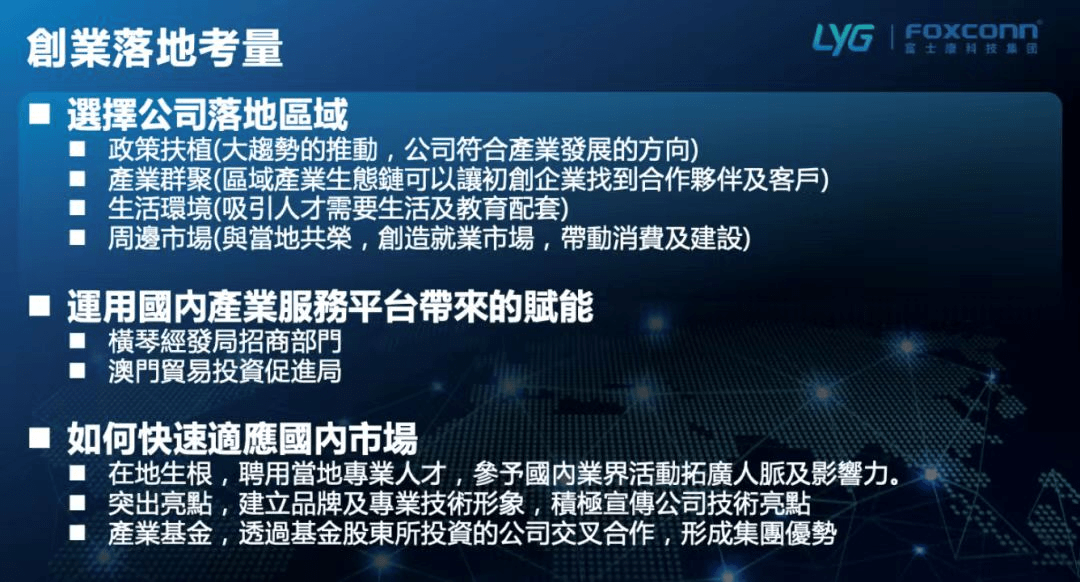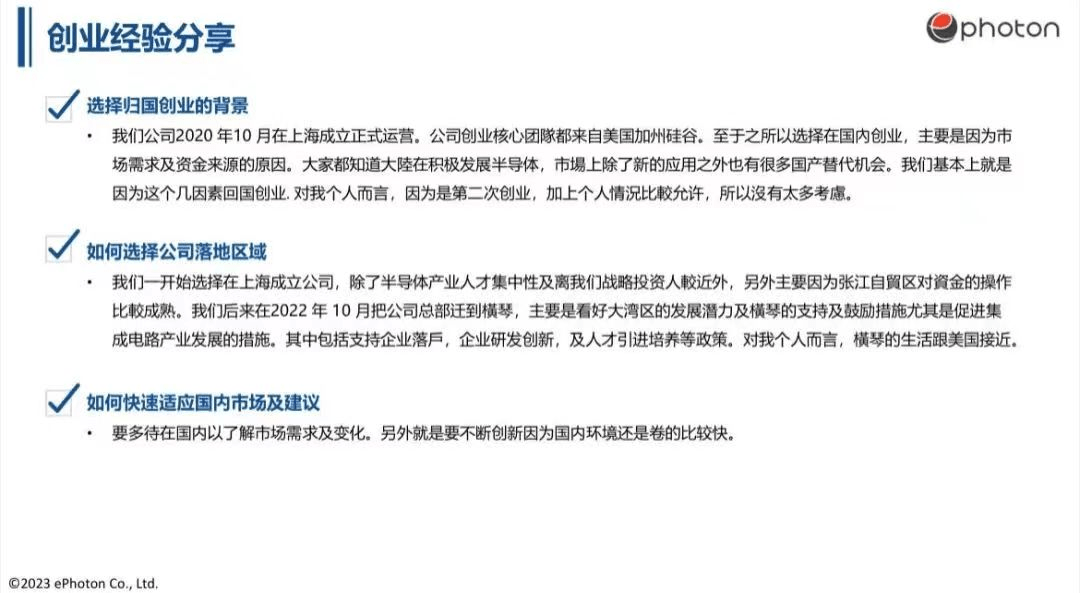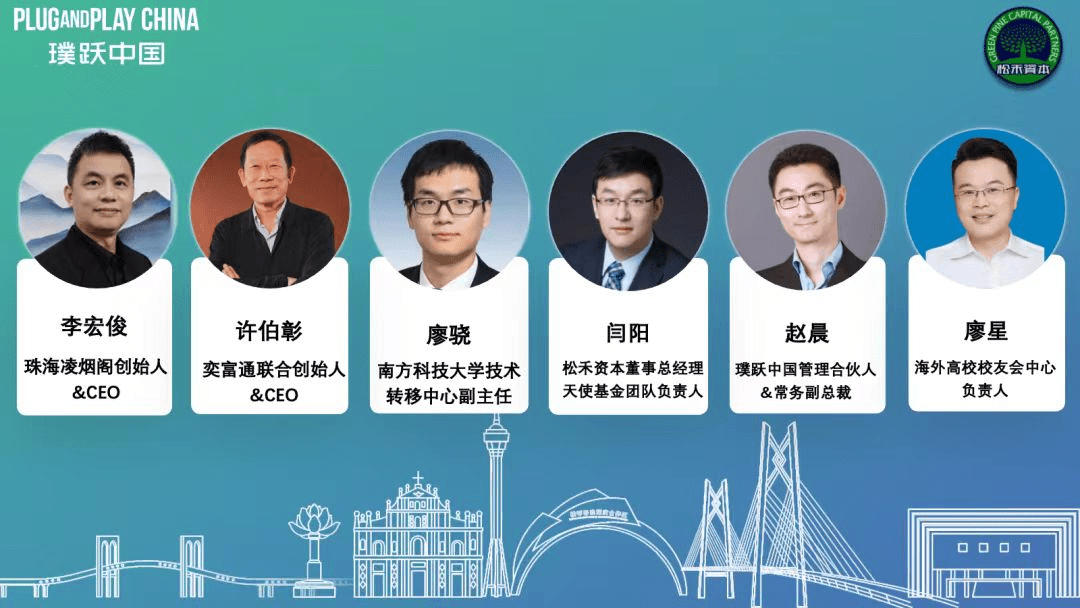2023-06-27
On June 19, the 11th session of Perceptive China's "Innovation Youth" series - "How to Land and Expand Business in China for Returning Entrepreneurs" seminar came to a close. Several guests shared and discussed their experiences, perspectives, and suggestions on returning entrepreneurship from different angles such as entrepreneurs, investors, technology transfer, etc.
This event was jointly organized by Perceptive China and Songhe Capital, and strongly supported by Hengqin circus Development. It also received assistance from overseas university alumni association centers, Peking University Innovation Society, Southern Cross Star Venture Capital Club, Berkeley Chinese Entrepreneurship Association (ACE), CEO Chinese Entrepreneurs Association, Yale Venture Capital Club (YVC), Jiaotong University Silicon Valley Alumni Association, and SparkX Science and Technology Creation. The seminar included three sessions: theme sharing, round table discussion, and policy and competition promotion. In the theme sharing session, two returning entrepreneurs shared their personal experiences of starting a business in China, as well as their experiences and reflections during this process.

Albert Li, founder &CEO of LYG, shared three points of thinking about the landing of entrepreneurship

Xu Bozhang, co-founder &CEO of Photon Integrated Technology, shared his experience of returning to China
The round table discussion session was moderated by Liao Xing, the head of the Overseas University Alumni Association Center, and a discussion was held with five guests on the challenges and thoughts of overseas entrepreneurs returning to China to start their own businesses.

Q1 What are the biggest challenges and difficulties encountered in the process of returning to China?
Albert Li: When starting a business, the first thing is to have the support of your family. Only with spiritual support you can persevere. In addition, I think "finding people" is the most difficult. In recent years, China has been very competitive, and it is difficult for small startups like us to compete with big companies in terms of salary or stock options. It is important to be able to explain your ideas to your team and candidates, and it is a great challenge to find team members who can identify with you and join your team.
Xu Bozhang: There are two challenges worth noting for landing. First, the choice of company location is closely related to subsequent talent recruitment, business development, fund acquisition and so on. This is also the reason why Silicon Valley in the United States has a high concentration of start-up companies, which brings continuous geographical advantages to attract entrepreneurs. Second, there is the problem of entrepreneurial landing itself. Many overseas Chinese entrepreneurs are frequent flyers because of their families. The market and R & D teams are in China and their families are overseas. If the founder is not in China for a long time, it will have a great impact on business and R & D.
Q2 From the perspective of investors, what are the characteristics of overseas returned projects?
Zhao Chen: In the projects we have participated in with a background of returning overseas Chinese, it is more common for founders to have studied and worked abroad for 5-10 years. Returning entrepreneurs who have worked in overseas countries, especially large overseas factories, have certain advantages in product positioning, market positioning, team building, global vision and internationalization. How to land and commercialize their products and teams accumulated over the years in overseas countries in China, and how to quickly and groundedly understand the domestic market may be the stages that these founders who have lived abroad for many years need to learn and adjust. The domestic market is very large, especially for hard technology entrepreneurs, and the strong learning ability of the founders combined with the information provided by investment institutions and incubation platforms makes returning to China to start a business very promising.
Q3 There are shortcomings in marketing, management, sales, etc. in the process of entrepreneurship of researchers. Does the Technology Transfer Office have any ways to help technology entrepreneurs?
Liao Xiao: This is a common topic that has been discussed for a long time. SUSTech has been exploring several approaches. Firstly, we provide training and empowerment in business for the project leaders who have technical backgrounds, such as improving the NSF's I-Crops program with localized modifications that are more suitable for hard technology entrepreneurship in SUSTech. Through training, we hope to increase the understanding of scientists and researchers on business and industry. Secondly, we are trying to do team matching and explore how to find better partners for the technical teams. We are trying to gather the alumni and classmates around the technical leaders who have industrial experience through some opportunities, and think together and collaborate around projects, hoping to form a good team.
Q4 See overseas entrepreneurs often crowded some hot track, investment institutions are more concerned about the field?
Yan Yang: Recently, the window of so-called track and field opportunities has been particularly short, such as last year's metaverse, earlier Web3, and even earlier disruptive new energy tracks like controlled nuclear fusion. At present, there are no particularly obvious track and field opportunities in China. Instead, there are continuous startups in the fields formed by technological innovations that have a wide audience, platform technology potential, can be reused in some industries to promote industrial or industry scene landing applications, and are based on strong technologies and research directions of colleges and universities. For many years, Songhe Capital has been paying attention to three hard technology directions: digital technology, innovative materials, and precision medicine. The angel team I am responsible for focuses on early disruptive technological innovations hidden under the two major directions of "green" and "smart". In addition, it is important to recognize that there is a considerable period of time and distance from scientific and technological breakthroughs to the final entry of technology products into specific industry scenarios. For example, we see that many new technologies have not entered factories and actual production processes, so many industries or tracks are worth entrepreneurs patiently cultivating. Seemingly outdated opportunities can still bring new vitality.
Q5 For those who have the idea of returning to China to start a business, please each guest give you the most important advice.
Albert Li: First of all, when starting a business, we must have financial thinking, good technology is only one hand, cost control, pricing calculation is also very important, so we must keep financial thinking in the process of starting a business; Secondly, the process of returning home to start a business is also very important, and actively participate in some good activities, whether it is for expanding contacts or looking for partners, can be beneficial.
Xu Bozhang: If you are ready to start a business, including ideological and material conditions, don't be afraid of trouble and enjoy the process of starting a business. The result of entrepreneurship is no more than four kinds: failure, lukewarm, merger and acquisition, successful listing, do not care too much about the result; Spend more time on business development and actively build contacts. Brand and contacts are cultivated with time. Finally, coordinate your upstream and downstream, and remember that many people want to succeed with you. Zhao Chen: Many overseas returnees have rich experience in product research and development, but as a returning technology company, it is more important to learn and understand with an open mind and accelerate the process of re-grounding themselves. Among the overseas entrepreneurs we have come into contact with, they can often stick to it because they are really interested in what they want to do, so there is no need to return to what they are really interested in because of the wind, and they are good at and have accumulated areas, and the domestic market is very large.
Yan Yang: Starting a business is very hard. Whether you think clearly and have enough passion and tenacity to lead your team to do pioneering business in China is very crucial. It is necessary to look up at the stars and bring back the best cognitive thinking and technologies and products that are not even available in China. It is also necessary to be down-to-earth, persevere in the industry you are in, and cooperate with the upstream and downstream partners of the industrial chain with an open mind.
Liao Xiao: Many of the projects I have come into contact with are very early or have just had entrepreneurial ideas of the team, for this type of team, it is recommended to come back more, come back to see more, participate in a variety of domestic activities and competitions. Entrepreneurship is not easy, but in the initial stage, there is nothing to lose, you can try a variety of ideas, contact a variety of people, may wish to come to the country to take a look, and then find a place to start rapid iteration, polish the product and team.
Graphic source: PLUGANDPLAY

